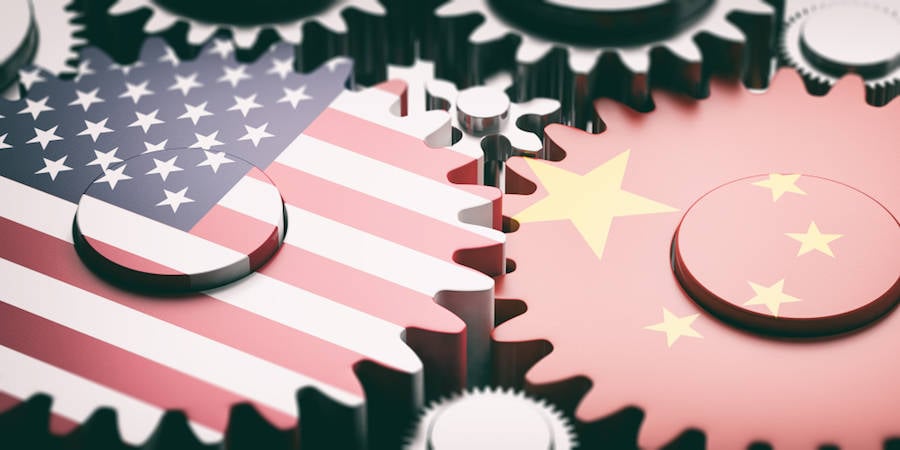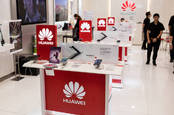How The US Attacked Huawei: Former CEO Of DocuSign And Ariba Turned Diplomat Keith Krach Tells His Tale

The United States' Clean Network plan has won support from 53 nations and 180 telcos, and Huawei has unwittingly legitimised it.
So says Keith Krach, the US Under Secretary of State for Economic Growth, Energy, and the Environment, who late last week spoke on a webinar hosted by the American Chamber of Commerce in Australia. The Register has obtained and viewed a video recording of the event.
Krach is a former CEO of DocuSign and SAP Ariba, and was appointed in 2019 after approaching vice president Mike Pence to share his concerns about the former company's prospects in China. He was appointed in 2019, and Secretary of State Mike Pompeo charged him with combating China's economic aggression.
"Divide and conquer" was his strategy from day one and Huawei was a particular target because it had become the de facto leader in 5G, which the US had identified as a technology that would touch on many aspects of industry and national security.
Huawei fell into our trap when they started bad-mouthing our brand
Krach's plan was to play on fear of China and trust in the US.
"It looked like Huawei was unstoppable and would run Europe's networks," he said. "We started with a strategy of addressing a long-term threat to security and other threats posed by the Chinese Communist party, rooted in trust principles.
"Trust is the Chinese Communist Party's biggest weak spot. People do not trust China."
Tech companies have scars that taught them that lesson, he said, recalling a dinner he convened in Silicon Valley attended by more than two dozen major technology CEOs from Google and other comparable companies.
"We started by asking for China horror stories and you would not believe what you heard," he said.
Even China's big trading partners don't trust it, he said, recalling how those he encountered in meetings would make it plain – often non-verbally – that they did not feel their relationship with the Middle Kingdom was comfortable.
But many had become comfortable with Huawei.

Shocking revelations from Huawei-commissioned report: Huawei is good for the UK's economy so don't ban them
READ MORE"Everyone wants to go with the leader and Huawei was the leader," he said. "Leadership means momentum and Huawei had momentum."
But the US believes Huawei is an arm of China's government, enables its pervasive surveillance regime and human rights abuses, and is also a critical part of its intelligence apparatus.
Krach's evidence for that is Chinese laws that require all companies and individuals to provide authorities with intelligence or data on request as a reason Huawei cannot be trusted. He also found Huawei's very keen 5G pricing suspicious. "Why do they give it to you or charge not much?" he asked. "So they can get your data."
And he asserted that the data can flow without backdoors or other hacks. Instead, he suggested that China can rely on regular code updates that attract little scrutiny but which are used to conduct intelligence operations.
The US set about disrupting Huawei with its export bans that choked its supply chain and restricted its ability to make more products. The Clean Networks plan, which requires local networks to be cleansed of anything Chinese in order to make them easier to trust, was another tactic. And once a nation or telco is trusted, access to US technology and markets becomes easier.
Krach travelled extensively and found allies at NATO and the European Commission who understood the Clean Network concept, both as a security construct and for its trade and diplomatic implications. They soon adopted it. The Under Secretary said European regulations that make telco directors personally liable for network equipment choices that go pear-shaped was one result of his efforts.
Reducing reliance on Chinese manufacturing was another tactic.
"We on-shored the most important 5G silicon company TSMC," he said. "We know people on the board and in two weeks [after a meeting] they announced a plant in Arizona."
In Krach's telling of the tale, US evangelism of the Clean Networks plan was noticed by Huawei and eventually drew a critical response.
"Huawei fell into our trap when they started bad-mouthing our brand," he said, advancing a theory that the criticism legitimised the Clean Network because the US is trusted and Huawei is not. He said the Clean Network brand will now persist because of Huawei's attacks.
Krach claimed the effect of the campaign is observable in the fact that the number of public commitments to build 5G networks based on Huawei technology has fallen from 91 to 12, by his calculations.
"I think Huawei might have ceased to exist as we know it," he said, citing its sale of the Honor handset business and the fact that alternative 5G players welcome OpenRAN platforms because they offer opportunities for innovation rather than buying a complete stack from one vendor.
The under secretary doesn't think the job is done, partly because China has realised that whoever controls standards controls the market.
"'Category kings' win and one of the ways to get there is to facilitate the standards yourself. We did that at DocuSign and Ariba," Krach said.
China's strong participation in standards processes means "the Chinese Communist Party has taken our strength and used it against us," he said. "Now we have to go above the standards with global alliances."
And part of that work will be continued criticism of China's national security law. "You just keep poking it and poking it and poking it until they change," he said.
Curiously, Krach's interlocutor on the webinar was Shekar Ayyar, executive vice president and general manager of VMware's telco and edge cloud business unit. VMware is a Clean Networks participant. ®
From Chip War To Cloud War: The Next Frontier In Global Tech Competition
The global chip war, characterized by intense competition among nations and corporations for supremacy in semiconductor ... Read more
The High Stakes Of Tech Regulation: Security Risks And Market Dynamics
The influence of tech giants in the global economy continues to grow, raising crucial questions about how to balance sec... Read more
The Tyranny Of Instagram Interiors: Why It's Time To Break Free From Algorithm-Driven Aesthetics
Instagram has become a dominant force in shaping interior design trends, offering a seemingly endless stream of inspirat... Read more
The Data Crunch In AI: Strategies For Sustainability
Exploring solutions to the imminent exhaustion of internet data for AI training.As the artificial intelligence (AI) indu... Read more
Google Abandons Four-Year Effort To Remove Cookies From Chrome Browser
After four years of dedicated effort, Google has decided to abandon its plan to remove third-party cookies from its Chro... Read more
LinkedIn Embraces AI And Gamification To Drive User Engagement And Revenue
In an effort to tackle slowing revenue growth and enhance user engagement, LinkedIn is turning to artificial intelligenc... Read more


